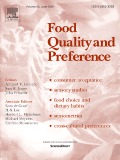Are nutritional warnings more efficient than claims in shaping consumers’ healthfulness perception?
Dublin Core
Título
Are nutritional warnings more efficient than claims in shaping consumers’ healthfulness perception?
Tema
ALIMENTOS
ALIMENTOS-ETIQUETAS
ADVERTENCIAS
BIBLIOGRAFIA NACIONAL QUIMICA
2020
Abstract
Background: Brazil is currently debating the implementation of front-of-package labels. This study tested if Warning labels (WLs) improved consumer understanding, perceptions, and purchase intentions compared to Traffic-Light labels (TLLs) in 1607 Brazilian adults. Methods: In this online, randomized controlled experiment participants saw images of 10 products and answered questions twice—once in a no-label, control condition and then again in a randomly assigned label condition. The relative differences in responses between WLs and TLLs between control and label conditions were estimated using one-way ANOVAs or Chi-square tests. Results: Presenting WLs on products compared to TLLs helped participants: (i) improve their understanding of excess nutrient content (27.0% versus 8.2%, p < 0.001); (ii) improve their ability to identify the healthier product (24.6% versus 3.3%, p < 0.001); (iii) decrease perceptions of product healthfulness; and (iv) correctly identify healthier products (14.0% versus 6.9%, p < 0.001), relative to the control condition. With WLs, there was also an increase in the percentage of people: (v) expressing an intention to purchase the relatively healthier option (16.1% versus 9.8%, p < 0.001); and (vi) choosing not to buy either product (13.0% versus 2.9%, p < 0.001), relative to the control condition. The participants in the WL condition had significantly more favorable opinions of the labels compared to those in the TLL group. Conclusions: WLs would be more effective, compared to the TLL, at improving consumer food choices.
Autor
Nobrega, Lía
Ares, Gastón
Rosires, Deliza
Fuente
Food Quality and Preference v. 79, 2020. -- p. 1-10. --e103749
Editor
MDPI
Fecha
2020
Derechos
Información sobre Derechos de Autor (Por favor lea este aviso antes de abrir los documentos u objetos) La legislación uruguaya protege el derecho de autor sobre toda creación literaria, científica o artística, tanto en lo que tiene que ver con sus derechos morales, como en lo referente a los derechos patrimoniales con sujeción a lo establecido por el derecho común y las siguientes leyes (LEY 9.739 DE 17 DE DICIEMBRE DE 1937 SOBRE PROPIEDAD LITERARIA Y ARTISTICA CON LAS MODIFICACIONES INTRODUCIDAS POR LA LEY DE DERECHO DE AUTOR Y DERECHOS CONEXOS No. 17.616 DE 10 DE ENERO DE 2003, LEY 17.805 DE 26 DE AGOSTO DE 2004, LEY 18.046 DE 24 DE OCTUBRE DE 2006 LEY 18.046 DE 24 DE OCTUBRE DE 2006) ADVERTENCIA - La consulta de este documento queda condicionada a la aceptación de las siguientes condiciones de uso: Este documento es únicamente para usos privados enmarcados en actividades de investigación y docencia. No se autoriza su reproducción con fines de lucro. Esta reserva de derechos afecta tanto los datos del documento como a sus contenidos. En la utilización o cita de partes debe indicarse el nombre de la persona autora.
Formato
Pdf
Idioma
Inglés
Tipo
Artículo
Identificador
DOI: 10.3390/nu10060688
Document Item Type Metadata
Original Format
Pdf
- Fecha de agregación
- May 11, 2020
- Colección
- Bibliografía Nacional Química
- Tipo de Elemento
- Document
- Etiquetas
- Advertencias, Alimentos, Alimentos Etiquetas
- Citación
- Nobrega, Lía, “Are nutritional warnings more efficient than claims in shaping consumers’ healthfulness perception?,” RIQUIM - Repositorio Institucional de la Facultad de Química - UdelaR, accessed July 3, 2024, https://riquim.fq.edu.uy/items/show/6051.
- Archivos

